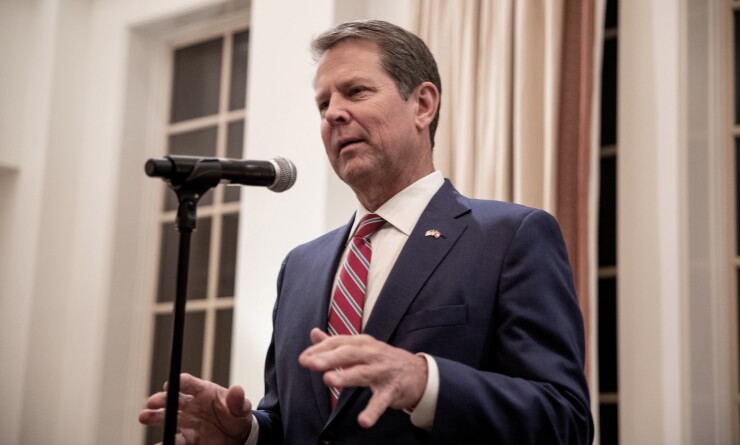After spending nearly $64 million in a legal fight with Georgia over water rights, Florida appears to be a two-time loser in the case.
Judge Paul J. Kelly, the special master in the case, has recommended to the U.S. Supreme Court that Florida be denied relief because the state didn’t prove the elements necessary to obtain a decree that would apportion Georgia’s consumption of water from the Apalachicola-Chattahoochee-Flint River Basin.

“Florida has pointed to harm in the oyster fishery collapse, but I do not find that Georgia caused that harm by clear and convincing evidence,” Kelly wrote in a
Kelly, whose report was released Wednesday, said he determined that the benefits of an apportionment would not substantially outweigh the harm that might result.
“This is especially true given that the Army Corps’ reservoir operations on the Chattahoochee River would prevent most streamflow increases from reaching Florida during the times when more streamflow is needed to alleviate Florida’s alleged harms,” he said. Kelly’s predecessor, Ralph Lancaster, also said Florida hadn’t proved its case.
Georgia Gov. Brian Kemp was pleased with the decision.
“We greatly appreciate special master Kelly's recognition of Georgia's strong, evidence-based case in this litigation,” Kemp said. “We will continue to be good stewards of water resources in every corner of our state, and we hope that this issue will reach a final conclusion soon.”
Former Florida Gov. Rick Scott filed a complaint against Georgia in 2013. Scott, now a U.S. senator, said the litigation was necessary “to stop Georgia’s unchecked and growing consumption of water" because it was threatening oyster beds and commercial fishing in Apalachicola Bay, in Florida's panhandle region.
Gov. Ron DeSantis allowed the case to continue after he took office in January. He didn't comment on the special master's report.
The case has been costly for the two Republican-led states.
Georgia had spent about $47.5 million on legal fees and related expenses as of Nov. 6, according to Katie Byrd, Georgia Attorney General Chris Carr’s spokeswoman.
Since Florida filed the case six years ago, the state had spent $63.4 million through October of this year, according to Dee Ann Miller, spokeswoman for the Department of Environmental Protection. DEP attorneys participated in the case.
“We are extremely disappointed in the report issued today by the special master with his recommendations to the Supreme Court on the Apalachicola-Chattahoochee-Flint case,” said a statement from DEP Secretary Noah Valenstein.
“The state of Florida remains committed to restoring the historic flows of the Apalachicola River and the families who rely on this river for their livelihood,” Valenstein said. “The water this river provides is essential for the Apalachicola Bay, and we will remain steadfast in our commitment to protecting it.”
Valenstein said his agency is still reviewing the report and evaluating what legal options there may be. The Supreme Court itself may disagree with the special master's conclusion, as it has once before in the Florida/Georgia dispute.
Kelly, a senior justice on the U. S. Court of Appeals for the Tenth Circuit, heard oral arguments from both states Nov. 11 in Albuquerque, New Mexico.
Former special master Ralph Lancaster, who died in January, had also recommended that Florida be denied relief in his February 2017 report to the Supreme Court. Lancaster made that finding in part because the U.S. Army Corps of Engineers was not a defendant in the case.
The Corps controls a significant amount of water in Georgia through reservoirs and dams in the basin, which is a major source of water for drinking, marine and agricultural resources in Georgia, Florida and Alabama.
In June 2018, the Supreme Court in a 5-4 decision concluded that Florida had met its initial burden in the case, with respect to a remedy, that extra water flowing from Georgia would “significantly redress the economic and ecological harm that Florida has suffered.”
The court ruled that Lancaster had applied “too strict a standard” when he said that he didn’t believe that the court could determine how much water would be appropriate for Florida to receive a significant benefit from a cap on Georgia’s use of water from basin.
The Supreme Court remanded the case to the special master with a series of instructions. Kelly was appointed special master in October 2018.
The court told the special master to determine if Florida suffered harm caused by decreased water flow into the Apalachicola River, if Florida showed that Georgia’s use of the Flint River is inequitable, and whether that potentially inequitable use harmed Florida.
The special master was also told to determine if an equity-based cap on Georgia’s use of Flint River waters would materially increase streamflow in the Apalachicola River. The court also said that Florida must show that the benefits of apportionment would substantially outweigh the harm that might result.
“I do not recommend that the Supreme Court grant Florida’s request for a decree equitably apportioning the waters of the ACF Basin because the evidence has not shown harm to Florida caused by Georgia,” Kelly concluded. “The evidence has shown that Georgia’s water use is reasonable and the evidence has not shown that the benefits of apportionment would substantially outweigh the potential harms.”





